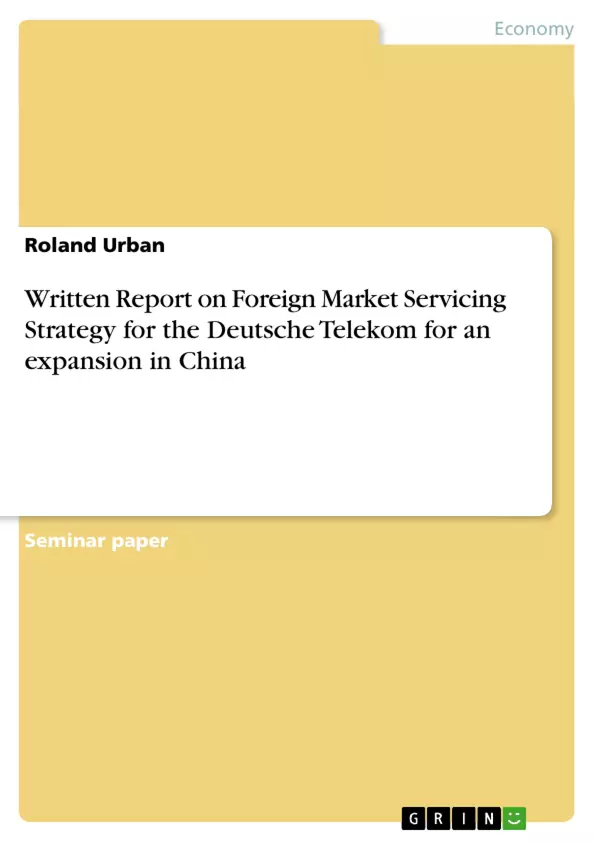In times of globalisation it is so important for our MNE Deutsche Telekom to find early new markets in order to detect or expand the position in the hard global competitiveness. We are good positioned in West Europe and in the growing markets in Eastern Europe and with our division T-Mobile also very successful in the USA, but the potential growth rates are much higher in Asia. The growth motor in Asia is China with the biggest population worldwide. Nearly 80 % of the top 500 companies have invested in China and it is the fast-growing telecommunication market in the entire world1. This shows how important China for our MNE is. The continuous high growth in this telecommunication industry leads to the question how our mobile division T-Mobile belonging to the concern Deutsche Telekom should invest in the coming most powerful market China after the USA. First of all, I am going to present the concern Deutsche Telekom and will then focus in detail on the division T-Mobile. Additionally, I am going to give an overview about the mobile industry itself and how the distribution of their products proceeds. Before I am going to recommend a market servicing strategy for our MNE, I would like to analyse the environment in China in which we want to invest and weigh up the advantages and disadvantages for an investment abroad2. After this analysis has been presented a proposal for the best type of international business strategy in China will follow and finally a summary finishes this assignment. 1 The People’s Bank of China (2004) 2 Daniels, J., Radebaugh L., Sullivan, D. (2004)
Inhaltsverzeichnis (Table of Contents)
- A. Main Part
- 1. Introduction
- 2. The concern Deutsche Telekom
- 2.1 General overview
- 2.2 The divisions of the concern
- 2.2.1 T-Com
- 2.2.2 T-Systems
- 2.2.3 T-Online
- 2.2.4 T-Mobile
- 3. The Telecommunication industry
- 3.1 Development within the industry
- 3.2 Technical Standard
- 3.3 Business policy
- 4. Environmental Analysis
- 4.1 Political environment
- 4.2 Economic environment
- 4.2.1 Market size
- 4.2.2 Economic Growth
- 4.2.3 Competitive situation
- 4.3 Sociocultural environment
- 4.4 Technological environment
- 5. Mode of Entry
- 5.1 Joint Venture
- 5.1.1 Equity Joint Venture
- 5.1.2 Contractual Joint Venture
- 5.1 Joint Venture
- 6. Recommendation for T-Mobile
- 7. Summary
- B. Bibliography
- C. Appendix
Zielsetzung und Themenschwerpunkte (Objectives and Key Themes)
This report focuses on developing a foreign market servicing strategy for Deutsche Telekom's expansion into the Chinese market. The report aims to analyze the Chinese telecommunication industry and recommend the most suitable mode of entry for T-Mobile, the company's mobile division.- Analyzing the potential of the Chinese telecommunications market for T-Mobile.
- Identifying key environmental factors influencing the telecommunication industry in China.
- Evaluating various modes of entry for foreign companies into the Chinese market.
- Proposing a suitable market servicing strategy for T-Mobile's expansion into China.
- Considering the strategic importance of China as a rapidly growing telecommunication market.
Zusammenfassung der Kapitel (Chapter Summaries)
- Chapter 1 provides an introduction to the report, highlighting the significance of the Chinese market for Deutsche Telekom's global expansion and the focus on T-Mobile's entry into the Chinese market.
- Chapter 2 delves into the structure of Deutsche Telekom, presenting an overview of the company, its divisions, and their respective roles within the telecommunications industry. This includes detailed information about T-Com, T-Systems, T-Online, and T-Mobile, emphasizing their global presence and capabilities.
- Chapter 3 examines the global telecommunication industry, highlighting its growth, technical standards, and business policies. It also introduces the concept of SWOT analysis as a framework for assessing internal and external factors affecting business strategy.
- Chapter 4 provides a comprehensive analysis of the Chinese market environment, focusing on political, economic, sociocultural, and technological factors. It further examines the market size, economic growth, and competitive landscape within the Chinese telecommunications industry.
- Chapter 5 delves into different modes of entry for foreign companies into the Chinese market, specifically focusing on joint ventures. It explores the advantages and disadvantages of equity and contractual joint ventures as potential entry strategies.
Schlüsselwörter (Keywords)
This report focuses on the telecommunications industry, market servicing strategy, foreign market expansion, joint ventures, and the Chinese market. The specific focus is on Deutsche Telekom, its mobile division T-Mobile, and their potential entry into the rapidly growing Chinese telecommunications market. The report analyzes the economic, political, and social environment in China, considering factors like market size, economic growth, and competitive landscape. The report also explores various modes of entry, including joint ventures, evaluating their advantages and disadvantages for T-Mobile's expansion into China.Frequently Asked Questions
Why is China an important market for Deutsche Telekom?
China has the largest population worldwide and is the fastest-growing telecommunication market, offering higher growth rates than Western or Eastern Europe.
Which division of Deutsche Telekom is the focus of this report?
The report specifically focuses on T-Mobile and its potential investment strategies in the Chinese mobile industry.
What entry mode is recommended for the Chinese market?
The report analyzes Joint Ventures, specifically comparing Equity Joint Ventures and Contractual Joint Ventures as potential modes of entry.
What environmental factors are analyzed in the report?
The analysis covers the political, economic (market size and growth), sociocultural, and technological environments in China.
What is the competitive situation in China's telecom sector?
The report notes that nearly 80% of the top 500 global companies have already invested in China, indicating intense competition but also significant opportunity.
- Arbeit zitieren
- Roland Urban (Autor:in), 2005, Written Report on Foreign Market Servicing Strategy for the Deutsche Telekom for an expansion in China, München, GRIN Verlag, https://www.grin.com/document/40940



